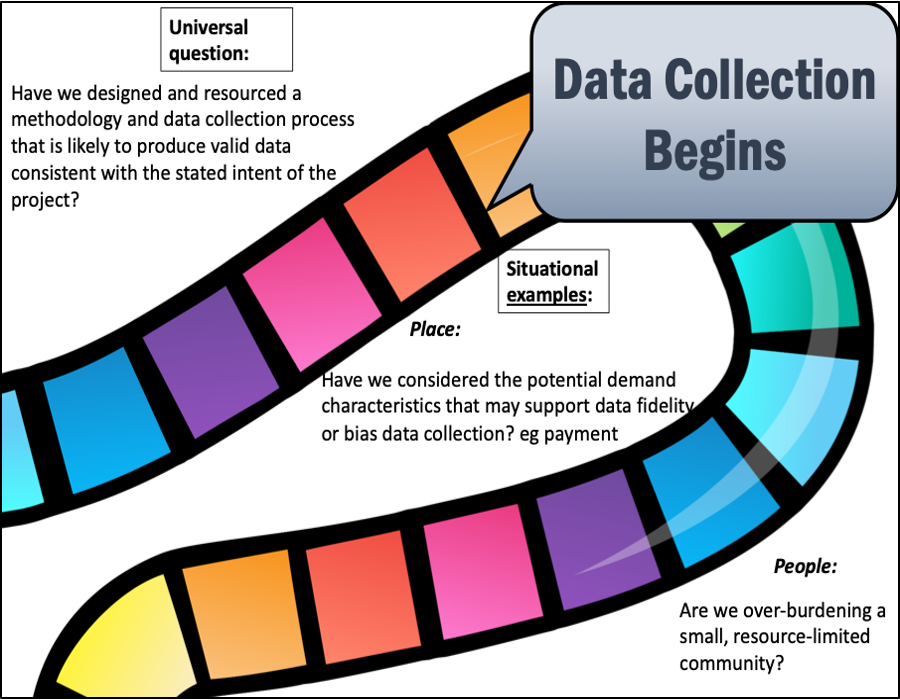|
Stage 6 DATA COLLECTION BEGINS
|
This may also be referred to as ‘field work’ when researchers engage with people, communities and other sources to gather data. It is often at this point that the 'realities' of the project become clear and ethical issues emerge with greater clarity. Beginning data collection is often the ‘busy’ time when there are many pragmatic tasks to be undertaken in a short timeframe with numerous deadlines and operational, logistical demands to balance. It is often a time when new or junior members of the team become more actively involved in the ‘doing’ of the project. |
|||
|
|
||||
|
Being alert to ethical dilemmas |
||||
|
Do our data collection processes present any potential risk or discomfort in the participants of this particular cultural context, or for researchers or partners? |
Supporting considerations:
|
|||
|
Working towards solutions |
||||
|
Place |
People |
Principles |
Precedent |
|
|
Remember: what works in your country of residence may not work in the location where you are doing research. Although much learning about location of data collection has already occurred, this is a time to really prioritise this learning process, with specific attention to how your data collection is being received. Pay attention to the ‘lived reality’ of engaging in data collection – how does it ‘feel’. For example: Is there hesitation, unease or concern being expressed or experienced? Is it possible to obtain voluntary participation or will it be influenced or induced by community leaders? Be prepared to adapt your processes (recruitment, informed consent and data collection methods) to the needs, resources and limitations of the context. See this as normal and to be expected. Don’t forget to put in an ethics amendment to reflect these changes. |
Work with local partners who know the language and culture. When it is not possible, work with interpreters (but make sure they are trained in the research methods, for example interviews). Consider a pilot application phase of the data collection process and ask for feedback from community representatives (Are the questions clear? How do the participants feel when answering them?). At this point, there is still time to make changes. Be in contact with relevant local institutions who can offer support if needed (eg child protection offices, police, hospitals). Prepare your governing bodies (ethics committees) for the likelihood of the need for fast turnaround amendments to accommodate place-based adaptations that become clear in early data collection (e.g., use of interpreters). This may be no more than a continuing conversation with key members of the governing bodies. |
Be respectful of the culture, the community, your participants and local partners. We trust that your research is relevant, but it is you who has to adapt to the context and not the context that has to adapt to you (be creative).
|
If possible, use methods already tested in this cultural context. If you are using specific instruments with normative information (e.g., psychometric assessments), find out if they have been adapted and / or have sufficient validity in that context. Go to the field prepared to face challenges - develop actionprotocols based on your previous experience & the literature. Pay special attention to challenges impacting vulnerable people. |
|
Body
